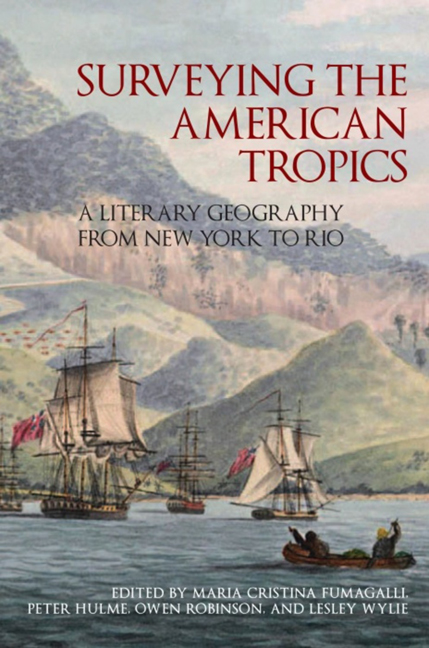Book contents
- Frontmatter
- Dedication
- Contents
- List of illustration
- Introduction
- A Tree Grows in Bajan Brooklyn: Writing Caribbean New York
- Reading the Novum World: The Literary Geography of Science Fiction in Junot Díaz's The Brief Wondrous Life of Oscar Wao
- Inventing Tropicality: Writing Fever, Writing Trauma in Leslie Marmon Silko's Almanac of the Dead and Gardens in the Dunes
- Imperial Archaeology: The American Isthmus as Contested Scientific Contact Zone
- Space Age Tropics
- Black Jacobins and New World Mediterraneans
- The Oloffson
- Dark Thresholds in Trinidad: Regarding the Colonial House
- Micronations of the Caribbean
- Golden Kings, Cocaine Lords, and the Madness of El Dorado: Guayana as Native and Colonial Imaginary
- Suriname Literary Geography: The Changing Same
- The Art of Observation: Race and Landscape in A Journey in Brazil
- Notes on Contributors and Editors
- Index
Suriname Literary Geography: The Changing Same
- Frontmatter
- Dedication
- Contents
- List of illustration
- Introduction
- A Tree Grows in Bajan Brooklyn: Writing Caribbean New York
- Reading the Novum World: The Literary Geography of Science Fiction in Junot Díaz's The Brief Wondrous Life of Oscar Wao
- Inventing Tropicality: Writing Fever, Writing Trauma in Leslie Marmon Silko's Almanac of the Dead and Gardens in the Dunes
- Imperial Archaeology: The American Isthmus as Contested Scientific Contact Zone
- Space Age Tropics
- Black Jacobins and New World Mediterraneans
- The Oloffson
- Dark Thresholds in Trinidad: Regarding the Colonial House
- Micronations of the Caribbean
- Golden Kings, Cocaine Lords, and the Madness of El Dorado: Guayana as Native and Colonial Imaginary
- Suriname Literary Geography: The Changing Same
- The Art of Observation: Race and Landscape in A Journey in Brazil
- Notes on Contributors and Editors
- Index
Summary
In a recent call for papers for a conference on Léon-Gontran Damas (hosted by the Postcolonial Research Group of the University of Antwerp in December 2008), the organisers asked: ‘Why has Guyanese literature (in Dutch, French, and English) remained thus far overlooked, particularly within Caribbean scholarship and more generally speaking in postcolonial literary studies?’ If indeed literature from and about the Guianas has been overlooked, it is not because of its scarceness. Restricting ourselves for a moment to Suriname, the geographic centre of the Guianas, we would note that in 2002 the indefatigable Michiel van Kempen defended a nearly 1,500-page dissertation on Surinamese literature up to 1975, and a year later published an updated 1,400-page version, in two volumes, covering the whole history. Including more than 100 pages of bibliography, it is both a monumental accomplishment and an engaging read, ranging from oral literature, including dance, theatre, and song (Carib, Arawak, Trio, Ndyuka, Saamaka, Creole, Hindustani, and Javanese), to all forms of written literature since the end of the sixteenth century. The whole of the thick second volume is devoted to literature written since 1957 and, like the earlier volume, includes numerous word portraits of authors. Getting this book out in English would, in one fell swoop, bring Surinamese literature into critical dialogue with other Caribbean (and world) literatures and go a long way toward responding to the challenge posed by the Antwerp postcolonialists. It's not, then, the scarcity of literature, but rather mainstream scholars’ non-mastery of the relevant languages as well as scholarly fashions, that has left ‘Guyanese literature … overlooked’.
Before beginning, a few words about how we situate ourselves in these geographic/literary spaces. Our own nostalgia for Suriname is always contrasted to our home base in seaside Martinique, where, as Derek Walcott writes, one has that ‘sense of elation you get in the morning in the Caribbean … the width of the ocean’. The clarity of the green-blue water, through which you can see the rocks on the bottom of the sea, the warm, sensual trade winds, the luscious air, the hills behind hills behind hills on three sides, the black snow drifting down and depositing a fine layer of ash from cane fields burning on the other side of the island over the mountains—all this is where we start from, where we think from, where we write from.
- Type
- Chapter
- Information
- Surveying the American TropicsA Literary Geography from New York to Rio, pp. 285 - 312Publisher: Liverpool University PressPrint publication year: 2013



